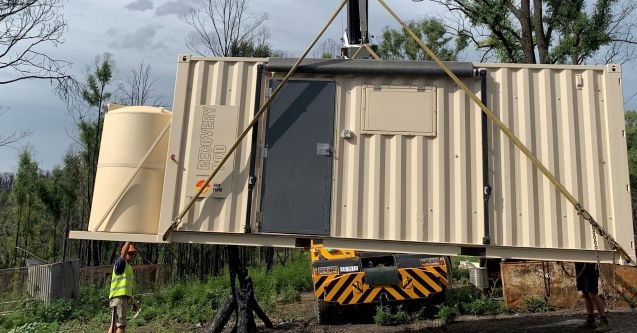Ongoing care key to supporting bushfire recovery
15 October 2020

As the complex recovery needs of communities impacted by the Black Summer bushfires of 2019-2020 continue to be addressed by Salvation Army recovery workers, team leader Martin Boyle wants to remind those affected to reach out for assistance when they need it.
“[We are] here to help and support people, we want to work with them, to empower them on their recovery journey,” says Martin, reinforcing The Salvation Army’s commitment to stand by impacted communities for the long haul.
Maintaining connections with people affected has been an ongoing aspect of the Salvos work in bushfire recovery as they continue to provide support through cash grants, consultations, counselling and pastoral care.
Forming strong bonds
A partnership between The Salvation Army, Minderoo Foundation and the New South Wales Government providing temporary accommodation pods has allowed many rural families the opportunity to stay together on their land with their animals. This has been an important practical and emotional step in assisting the recovery journey for many who lost everything.
Mogo, NSW resident, Sara Gardner’s home was one of more than 3000 houses destroyed during the Black Summer bushfires.
“We were completely wiped out – everything gone,” Sara recalls. “We were on a seven-acre property with two houses, a full mechanic’s workshop and stables.”
As one of the first recipients of a recovery pod, Sara and her family have been grateful for the temporary home while they investigate more permanent solutions. But the combined effects of the COVID-19 pandemic, recent floods and Sara’s mum being unwell, has mounted extra pressure on the family. While she has received financial support from charitable and government agencies, she has been particularly grateful for her Salvos bushfire outreach worker, Tammy.
Tammy has been working with Sara and her family to provide not just financial support through bushfire grants or gift cards, but also a listening ear, as the family navigate their way through different challenges.
When flooding caused some damage to Sara’s pod recently, Tammy was quick to assist. “Tammy has been awesome. She rings me up, asking me how I’m going and if I need anything,” Sara says. “We have a joke and we don’t just talk about what’s going on, we talk about everything.”
It’s this ongoing emotional support and friendship with Tammy that Sara has been particularly grateful for, adding she was happy to have someone to chat with and lean on – someone who not only understood her struggles but could also offer support outside of her family.
Connecting with community
When fires ripped through her town of Cobargo, in the Bega Valley Shire, NSW, Gaile Struther stayed up all night to get her family to safety. Located just outside of the centre of town, she was with her son and his family when they evacuated.
“When we returned the next day, everything was gone – but the barn was standing. We were pretty devastated,” she says.
While the barn remained intact, it was uninhabitable due to smoke damage and shattered glass from exploded windows.
“My son and his family went to his partner’s family’s house in town, because they had air conditioning so the kids wouldn’t be breathing in the smoke,” says Gaile who moved in with a friend for five months. “I was insured but I didn’t know at that stage how that would all go.”
Thanks to government and charitable grants, Gaile has begun rebuilding her life and property. She recently purchased a new generator, water tank, a temporary mobile home and gardening equipment.
The recent challenges brought on by the COVID-19 pandemic have been especially tough on Gaile and the Cobargo community.
“We are only a small village and the coronavirus has separated us,” says Gaile. “Before that, we were recovering quite well and all of a sudden you are on your own. In my case, I was living with a person who was having chemotherapy, so we had to lockdown at the first whisper – you sort of become a bit isolated.”
In response to ongoing social distancing requirements, The Salvation Army’s Bushfire Recovery Team went mobile – using donated vehicles such as Winnebagos, to drive out to communities impacted by the Black Summer bushfires, particularly those in regional and rural areas.
It was during one of these trips that Gaile met an outreach worker and received a Salvation Army bushfire relief financial grant. She, like many other Cobargo residents, has used this grant to help re-establish her property.
“I’ve ordered gardening equipment and a shed to get rid of this blackness that is around us – things are certainly looking up that’s for sure,” she says.
Though the last few months have been tough on Gaile and her community, she has a more positive outlook on life. Her home is looking likely to be rebuilt in the next 12-18 months, and with long-term support from organisations like The Salvation Army, the Cobargo community have been given hope where it’s needed most.
“The people that are up there are just amazing,” says Gaile. “Lovely people to talk to and they certainly make you feel much better. People out here are so grateful. I don’t know what we would have done without you.”
The Salvation Army remains committed to helping people like Sara and Gaile for the long haul – whether that’s through financial assistance or extending a hand of friendship on their journey to full recovery.